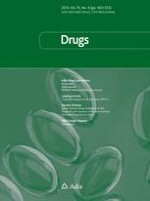01.12.2009 | Leading Article
New Pharmacological Developments in the Treatment of Hepatocellular Cancer
Erschienen in: Drugs | Ausgabe 18/2009
Einloggen, um Zugang zu erhaltenAbstract
Hepatocellular carcinoma (HCC) is the most common primary liver neoplasm and fourth leading cause of cancer death worldwide. The survival for patients with advanced HCC is extremely poor. This is largely attributed to the lack of effective screening methods, advanced stage at presentation, limited utility of surgical intervention and ineffective medical therapy. Over the past 30 years, many conventional cytotoxic agents have been tested and have failed to confer a survival benefit. Recently, sorafenib, a multi-tyrosine kinase inhibitor, was approved by the US FDA as first-line therapy in HCC as the first agent demonstrating survival benefit in this disease. Although the survival benefit demonstrated by sorafenib is moderate, molecular targeted therapy has brought new hope in the management of HCC.
Anzeige











